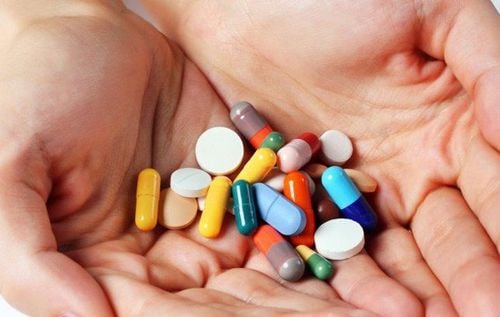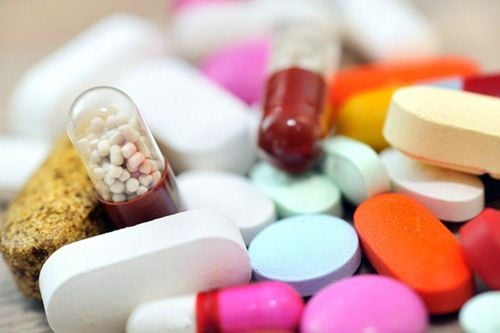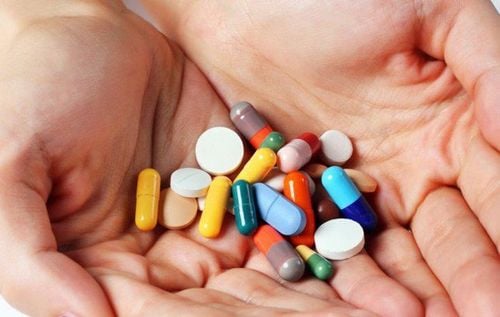This is an automatically translated article.
With the main ingredient is Cefazolin - a "first generation" cephalosporin antibiotic, Gastufa is effective in inhibiting the growth of many types of bacteria. As a result, the drug is indicated for the treatment of infectious diseases in many organs such as: urinary, ENT, bone and joint... So what is Gastufa? What is the use of the drug? Please read the article below.
1. What is Gastufa?
What is Gastufa? The ingredients that make up the Gastufa drug line are Cefazolin (in the form of Cefazolin sodium) 1g of other active ingredients and excipients with sufficient drug content.
Cefazolin ingredient in the drug is known to inhibit and kill Gram-positive bacteria caused by Staphylococcus aureus, Staphylococcus epidermidis, Streptococcus beta - hemolyticus group A.
However, with Gram-positive bacteria, Cefazolin only It was moderately effective and had no effect on Enterococcus faecalis.
2. Uses of the drug Gastufa
With the ability to act against many types of bacteria, Gastufa is indicated in many infectious conditions such as:
Sepsis, endocarditis. Oral, skin, serosa, bone and joint infections. Bacteremia and endocarditis. Infections of the biliary tract and urogenital tract. Like many other drugs, Gastufa is also not indicated in cases where the patient is allergic to Cefazolin or any of its excipients. In addition, the drug Gastufa has some other contraindications to the drug such as:
Patients with hypersensitivity to lidocaine or any of the ingredients in the drug Patients with liver failure, kidney failure Patients with a history of allergy to penicillin. Note, contraindications to Gastufa must be understood as absolute contraindications, not for any reason that contraindications to Gastufa are flexibly assigned to this subject. Therefore, patients should carefully read the instructions before using the drug, and consult with the doctor, pharmacist for advice. Do not arbitrarily change, use at will, avoid affecting health.
3. Dosage and usage of Gastufa
Gastufa medicine is in the form of a syringe. The drug is injected by deep intramuscular route, injected slowly into a vein for 3 - 5 minutes or intravenously.
Dosage of the drug can be adjusted according to the patient's condition and age. Below is the recommended dose:
For adults, the dose will be from 0.5 - 1 g, every 6 - 12 hours. Experts recommend the maximum dose of the drug for this subject is 6 g / day. However, if the patient has a serious, life-threatening infection, the dose may be increased to 12 g/day. Although Gastufa is not recommended for infants, in an emergency the dose for infants under 1 month of age is 20 mg/kg body weight. The time interval between 2 injections is 8 - 12 hours to ensure safety. Children over 1 month old can be prescribed a dose of 25-50 mg/kg body weight/day. The time between 2 injections is 4-6 hours, the day of injection is from 3 or 4 times. In the case of children with severe infections, the dose of Gastufa can be adjusted to be 100 mg/kg body weight/day. In general, depending on each specific case, the doctor will consider the appropriate dose for this sensitive object. The dose for the prophylaxis of surgical infections is 1g. The appropriate time for injection is 1 hour before surgery. If the patient has surgery for a long time, the next dose of 0.5 - 1 g will be indicated during surgery to increase prevention. After the end of surgery, the dose of 0.5 - 1 g will continue to be injected, every 6 - 8 hours for 24 hours or for 5 days for patients with open heart surgery, orthopedic transplants. Patients with renal impairment should be dose reduced. Dose adjustment in this population may be based on creatinine clearance. Specifically: Creatinine clearance 35 - 54 ml/min: Usual dose, injection time between 2 injections is 8 hours Creatinine clearance 11 - 34 ml/min, reduce by 1/2 the usual dose, injection time Between 2 doses is 12 hours Creatinine clearance £ 10 ml/min, use 1/2 of the usual dose, the time between injections is 18-24 hours/time. Note above is the recommended dose, the patient can be changed the dose depends on many factors. However, patients should not arbitrarily change the dose or stop taking the drug without a doctor's prescription.
When prescribing, doctors often advise patients to avoid missed doses/overdosage. In case of accidental missed dose/overdose, the patient should consult the doctor about the treatment measures, do not arbitrarily double the dose to make up for the missed dose. As such, there is a risk of an overdose and serious complications.
4. Gastufa drug interactions
Taking one or more drugs together may increase the effectiveness of treatment or potentially more side effects. Therefore, before being prescribed Gastufa, patients need to inform about the drugs they are using. From there, the doctor will consider increasing/decreasing the dose between drugs or stopping certain drugs altogether.
Currently, some drugs with nephrotoxicity have been recorded: such as aminoglycosides, diuretics furosemide, ethacrynic acids will increase nephrotoxicity. Probenecid slows the elimination, thereby prolonging the effect of the drug.
In addition, the patient should consult a doctor about whether the simultaneous use of foods or alcohol, beer, tobacco with Gastufa has any effect. To avoid unwanted health risks.
5. Side effects of the drug Gastufa
Gastufa like many other infectious drugs also has undesirable side effects such as:
Common mild side effects such as: itching, skin rash, urticaria... These signs will disappear on their own after when stopping the drug. Some more severe side effects such as anaphylaxis, Quincke edema, Stevens-Johnson syndrome ... These symptoms are often prolonged and require intervention from a doctor. In addition, patients may experience other side effects such as nausea, vomiting, abdominal pain, diarrhea, pseudomembranous colitis, elevated liver enzymes....
6. Notes when using Gastufa
To use the drug safely, patients need to know the following notes:
Patients with a history of allergy to cephalosporins, penicillins or other drugs should inform their doctor. Due to reports of partial cross-allergy between penicillins and cephalosporins. Patients with gastrointestinal diseases, especially colitis, should be cautious when prescribed broad-spectrum antibiotics such as: Gastufa Avoid long-term use of Gastufa, because there is a risk of increasing the bacteria non-susceptible bacteria. Women who are in pregnancy can safely use Gastufa, to treat some bacterial infections such as pyelonephritis. Women who are breastfeeding should be careful when using this drug. Although the drug in breast milk is very low, the composition of cefazolin can negatively affect the change of the intestinal microflora, have a direct effect on the nursing infant and the results will be confounded when it is necessary to test the antibiotic in the patient. child has a fever. Therefore, doctors only prescribe Gastufa to this person when the benefits outweigh the risks. Thus, the article has helped readers answer questions about the drug Gastufa. If in the process of using the drug, the patient has any questions and also shows any unusual signs suspected of being caused by Gastufa, they should contact their doctor.
Follow Vinmec International General Hospital website to get more health, nutrition and beauty information to protect the health of yourself and your loved ones in your family.
Please dial HOTLINE for more information or register for an appointment HERE. Download MyVinmec app to make appointments faster and to manage your bookings easily.













